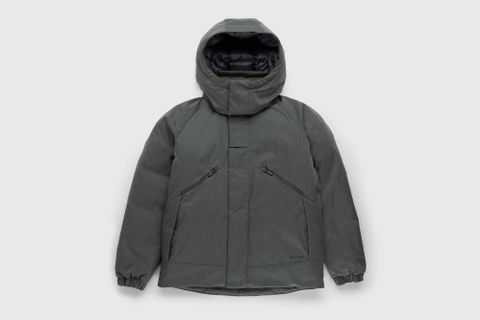mfpen SS23 Iterates on Reiteration
If you wanna know the clothes that I find terribly exciting, look no further than Copenhagen-based mfpen. Its unassuming apparel provides the perfect barometer for distinguishing "fashion" and "clothes," a subject I find endlessly fascinating.
To me, well-considered clothing is far more exciting than any Fashion Week social media moment or quirky statement piece.
I mean, I also believe that clothes ought to be at least somewhat distinctive (otherwise they're just, well, body coverings) but there's nothing worse than high-effort apparel. Rather, I posit that the perfect clothes are the things that you can mix n' match without thinking about it, guided by the profound confidence of knowing that everything you're touching blends together seamlessly.
mfpen founder Sigurd Bank gets it. You can't make clothing this inherently approachable without appreciating the art of effortlessness.
Note that this sort of design philosophy isn't about making clothing that's indistinguishable from basic, basic, basic stuff that might as well be thrifted.
If you're utilizing resources to create new products, you owe it to yourself, your consumers, and, hell, the planet, to devise clothing that's got a justifiable reason to exist.
Again, Bank gets it.
For one, "we constantly source deadstock fabrics," he explains to Highsnobiety. "While other brands [acquire fabrics for a single season], we source for both current and future collections. So when we design a Spring/Summer collection, we go to our own archive and utilize the lighter fabrics that hang together nicely.
"So, for next spring, you could find a pair of our Studio Trousers in a fine jacquard wool that we sourced three years ago that hangs perfectly next to an Exact Shirt in a striped [textile] that we came across during the sampling process and managed to squeeze in. There’s a harmony to it when things comes together naturally."
This is where mfpen's eco-conscious creativity meets modularity. Everything it creates every season is complementary to everything that came before and everything that'll come next, a perfect ouroboros of intelligent design.
"Our collections are always a continuation from the previous one," says Bank. "We don't have an urge to distinguish between collections or reinvent the wheel [and] as we do quite classic silhouettes we don't have to change a lot in terms of the designs.
"The creative output is constant but the market forces you to [separate] it into two collections per year. Our inspirations and reasoning stay the same."
mfpen's Italian- and Portuguese-made clothes subtly update staple shapes to enhance their inherent wearability — shirts have a wider torso and arms, most pants have built-in drawstrings — but its astute process doesn't obscure the uncomplicated aesthetic.
These are the wearable clothes you've seen adults wear for decades, just made better by ethical production, quality fabrics, and refined silhouettes.
No wonder mfpen is so popular among even the most discerning retailers: stockists include Toronto's Neighbour, New York's CHCM, Seoul's 8DIVISION, Tokyo's store carol and the longstanding Japanese tastemakers at 1LDK.
It must be said that mfpen's appeal makes more sense in person, as is typical for designers of utilitarian clothing.
It's all in the fit, the finishing, the thoughtful touches that can't possibly translate through a screen.
Bank cites stylistic influence for mfpen's Spring/Summer 2023 collection from an assortment of musicians — Slint, Nirvana, The Beastie Boys, The Smiths' Morrisey and Joy Division's Ian Curtis — who were all often lumped together under the meaningless banner of "alternative" music back when people still bought records in stores.
Alternative to what? Normal stuff, I suppose.
Fitting for mfpen, though, which specializes in garments that provide an imminently wearable but far more interesting "alternative" to normal clothing.


